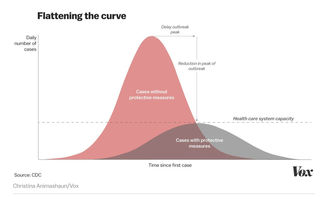Coronavirus Disease 2019
Let Me Remind You How Smart You Are
Reflections on COVID-19.
Posted March 12, 2020
It’s a self-evident fact that only smart and well-informed people read my Psychology Today column, so well done you!
You’re one of the smart ones (and did I mention how good you are looking these days, have you lost weight? No? Seriously? Have you been working out—you look terrific!) And the reason I point out all these obvious things, is that I want to follow-on from my talk of cognitive dissonance last week with a practical example—and I want you sitting comfortably, paying attention, and feeling good about yourself.
As you recall, cognitive dissonance is the tension created when a person has to hold contradictory thoughts in their head simultaneously. Something has to give, and often what gives is the acceptance of new information, which might seem to otherwise imply that we were being stupid or foolish in the past. So, I want to be clear from the outset that no-one is (or was) being stupid.
And, no-one is evil either. You are all good people who don’t want people to die, least of all if those people are yourselves. And you could. You--not someone else—could die of this. Someone who didn’t know that soap dissolves fats (which coat viruses, but you knew that) might have touched someone, who touched someone, who touched someone and, because no one broke the chain by washing their hands you might have it. You might not have thought you could die of this—because this disease “is just like flu”, but, as you know now (because you’ve been paying attention and, like I said, you are smarter than average) it isn’t like flu.
It feels like flu to some people, and those people are the lucky ones, but to some others it feels like drowning. Because that’s how it kills you. It drowns you in your own fluids. And because you are a smart and well-informed person, you also know that this doesn’t “just happen to the elderly”, especially not "those who were going to die anyway", it happens to young people as well. It could be you needing that intensive care, just as it was the heroic 34-year-old opthalmologist — Li Wenliang — who first blew the whistle on this horrible disease. Alas, he did not get enough care, or in time, and now he is dead.
Some figures put the number of those that will need hospital care at one in five. Some make it lower, but not much lower. Not all of those will need intensive care, but some will. If you want to give yourself nightmares go and read the accounts coming from Italy where heroic doctors and nurses are having to make decisions such as "Who gets to live? A fit 40-year-old or a slightly weaker one with kids". If you think I am joking then we need to have a nice cup of tea and a sit-down chat about my sense of humor. When all this is over.
And, following on from this, because you are a smarty pants, you know how geometric progression works. It’s that old story you remember about the guy who invented chess. The emperor he presented it to was so pleased he granted him whatever payment in rice he wished. And the chess inventor wanted a grain of rice on the first square of the chessboard, two on the second, four on the next and so-on. The emperor happily said yes only to realize that he had handed over his kingdom because doubling up like that meant that four became eight became 16 became 32 all the way up to weighing more than all the humans who have ever lived.
And, doubtless because of those afore-mentioned smarts of yours (and did I mention that that attractive person in the office asked me the other day if you were single?) I need hardly point out that such doubling is very close to what happens when one person infects two, and they infect four. Especially as those people stay infectious for several days, often without symptoms, which means that a lot of people are going to get it. But, and here is the crucial point, not at the same time.
The good news is that intensive care—which keeps people breathing until their immune system and anti-virals can fight it off—works. We just had the first complete recovery from my local hospital here in Cork. But those heroic doctors and nurses need all the help we can give them. And a large part of that help we can give them is not all turning up needing intense help at the same time.

Which means flattening the curve. This is a nice visual and, because you are a nice person (and I feel we have got to know each better over the last couple of minutes) I feel sure you are going to want to share it with as many people as possible, because it very swiftly and concisely shows exactly why we have to socially isolate, wash vigorously and routinely, and ban all large gatherings which would otherwise just accelerate that process of doubling.
We have to flatten that curve to give the medics a fighting chance, to give all of the rest of us a fighting chance. Please help.
For up-to-date information, check out the WHO site.




